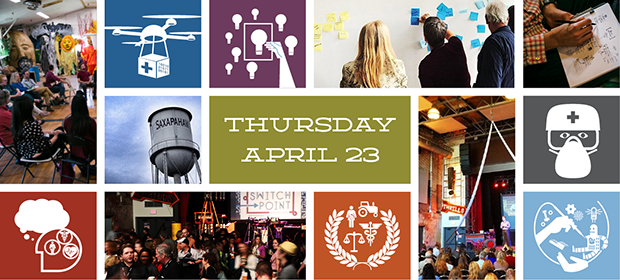Where We Work
See our interactive map


“We can all have an impact,” Kennedy Odede said from the stage today at SwitchPoint 2015. “We can all change lives. When you look around and things are not good, that is the time to act.”Odede knows what he’s talking about. Growing up in Kibera, Kenya—Africa’s largest slum—he spent a lot of time looking around, and seeing that things were not good."I was a homeless kid,” he said. “I left home. I started eating from the garbage.” Odede was desperately poor, as was his entire community, and he couldn’t see any hope.So he acted. He founded Shining Hope for Communities, and today his work to educate girls and provide services to Kibera has helped over 70,000 people.“If you are privileged, it is important to accept that you are privileged,” Odede emphasized, “and to think of what you can do with it for others.”And that’s the essence of SwitchPoint, really.Hundreds of participants from around the world gathered today in Saxapahaw, North Carolina, all looking for forces to join, partnerships to forge, and good to do.In case you couldn’t join us, here are just a few other highlights from day 1:Digital Humanitarians, Digital JedisDrones often get a bad rap. They’re associated with warfare, espionage, and overenthusiastic hobbyists, among other sinister things. But these flying robots, as Patrick Meier calls them, are capable of much more than that.For instance, data collected by drones—or unmanned aerial vehicles (UAVs)—are helping Namibia’s wildlife rangers assess what types of animals are scattered throughout the country, and how many, so they can conserve and protect them from poachers and other threats.
If you can click 'like' on a Facebook post, you can be a digital humanitarian.
And in Vanuatu, Meier and the Humanitarian UAV Network assembled hundreds of UAV pilots to survey the effects of Cyclone Pam. They’re using drones to capture high-resolution photos of flooding and building damage. Satellite imagery gives only a bird’s-eye view, Meier says, and that can hide a lot of the real damage. But UAVs capture a more nuanced perspective.Then, through a crowdsourcing organization called MicroMappers, do-gooders and digital Jedis everywhere can contribute to the effort by scouring the thousands of images and annotating them to pinpoint various levels of damage.The data they’re collecting in Vanuatu is playing a key role in the humanitarian relief effort there, helping the tiny island nation to recover more quickly.“There’s an incredible amount of goodwill out there,” Meier said today. “People want to be part of the solution. We used to have to be geographically there to help in this kind of relief work, but now, if you can click ‘like’ on a Facebook post, you can be a digital humanitarian.”The Real Heroes of Global Health“Global health and development is a very competitive field,” noted Leslie-Anne Long of mPowering Frontline Health Workers. “We’re all competing for the same pots of money and we’re not used to sharing our expertise. But what we’ve seen with Ebola has been very different.”The Ebola outbreak in West Africa has brought together organizations such as mPowering Frontline Health Workers, IntraHealth International, UNICEF, and many others to work toward some shared goals—namely, to end the epidemic and to strengthen the region’s health systems so it doesn’t happen again.
We have state-of-the-art facilities, but not enough health workers to staff them.
Technology and leap-frogging progress can help us on the way to stronger health systems, but—as Bankole Cardoso, founder of Easy Taxi Nigeria, pointed out—countries must be smart about how they fast-track their development.Nigeria is an example of the risks, Cardoso said. “We have many medical hospitals, but no simulation labs. We have state-of-the-art facilities, but not enough health workers to staff them.”“It takes great courage to work on the front lines of health care,” said Pape Gaye, president and CEO of IntraHealth. “Who in this room would have the courage to step up and help in a situation that you know is dangerous, where you don’t have the equipment or training you need, and where you know your life is at risk? If you think you could do this job, please stand up.”He looked out on the crowd, and we all looked at one another. No one stood up.But the creative thinkers who gather for the annual SwitchPoint conference are brave enough to imagine solutions to some of today’s biggest problems. So maybe we’re bolder than we think.Read highlights from SwitchPoint day 2: 3D-Printed Hands, 3-Cent Maxi Pads, and More at SwitchPoint 2015You can follow what’s happening at SwitchPoint 2015 on Twitter, Facebook, and Instagram. Join the conversation: #SwitchPoint
Get the latest updates from the blog and eNews




